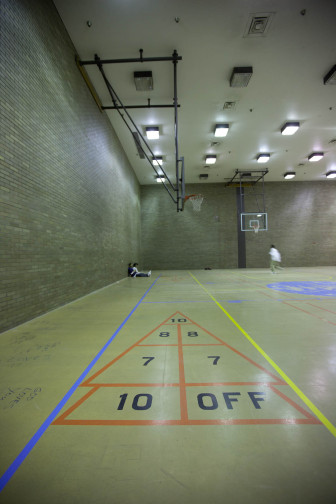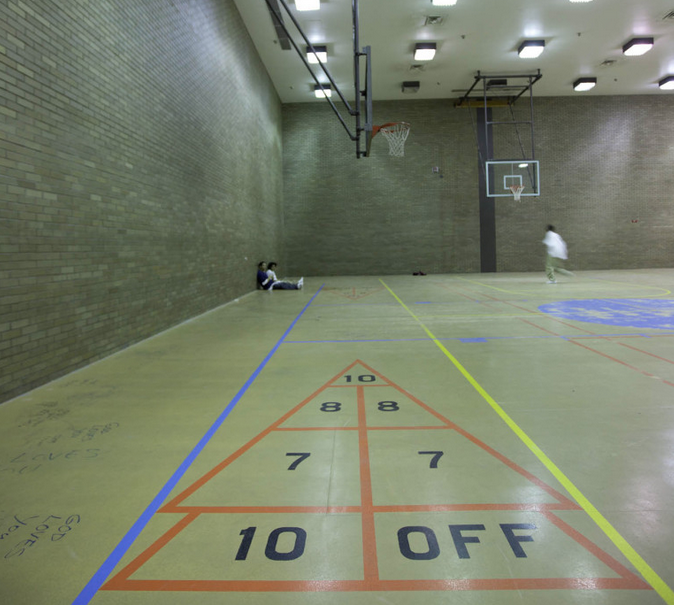
Richard Ross / www.juvenile-in-justice.com
Cook County Juvenile Detention Center, Chicago, Illinois.
From The Chicago Bureau:
Thousands of young adults in Cook County are missing out on getting a clean start in life by failing to take advantage of the state’s liberal expungement laws for individuals who’ve committed crimes as a juvenile.
In 2013 the Cook County Circuit Court Clerk’s office had 5,994 juvenile cases on file and only 661 sought expungement of their criminal records – with only one being denied.
Dorothy Brown, Clerk of the Circuit Court of Cook County, called it “abysmal” to have so few people seek and be granted expungement, “especially since it is so easy…I think the main thing is education,” about the simplicity of the process.
Many people, she said, may not know they can get their juvenile records expunged, or think they can’t afford it. But Brown said fees associated with the process can be waived. Fees typically are $64 for the Circuit Court Clerk’s office and $60 for the Illinois State Police.

- Dorothy Brown
And while the number of juvenile expungements is low, they are up from when Brown first took office in 2000. Of the more than 7,000 juvenile cases filed that year, only 46 cases were expunged.
Brown has begun an aggressive campaign to get the word out about the state’s expungement process including information on pardons and clemency petitions. Her office will host its annual expungement summit for both adults and juveniles on Saturday, June 7 from 8:30 a.m. – 6 p.m., at Living Word Christian Center, 7600 W. Roosevelt Rd., Park Forest, IL.
The state’s juvenile expungement laws, which Brown said are “probably one of the best in the country,” make it possible for almost any crime committed as a juvenile to be wiped cleaned as soon as they turn 18 years old.
At that age, Class B and C misdemeanor offenses such as shoplifting can expunged from their record as long as they have no other cases in juvenile or adult court. Similarly when juveniles turn age 21 – or five years have lapsed since their last juvenile case – everything committed as a juvenile with the exception of DUI, sexual assault and first degree murder can be expunged, Brown said. But most cases are the lesser offenses.
“Those are the only thing a juvenile can’t get taken off their record and they are records wiped clean as long as those offenses were done while they were juveniles,” Brown said. “That is why I say we probably have the best in the country because there is no excuse for anyone to have a juvenile offense on their record.”
 Most individuals needing juvenile records expunged are for minor offenses such as for property damage, minor drug offense or for behavioral issues in schools, said attorney Anne Geraghty Helms, of the law firm DLA Piper.
Most individuals needing juvenile records expunged are for minor offenses such as for property damage, minor drug offense or for behavioral issues in schools, said attorney Anne Geraghty Helms, of the law firm DLA Piper.
Helms launched a pilot program with several law offices to hold expungement clinics in Chicago Public Schools. The program targets alternative high schools where students may have had contact with the criminal justice system. Two clinics were held so far this year. They hope to offer more before the school year ends.
She said most don’t take advantage of the process because they think it’s too cumbersome and then usually seek help when it catches up with them later in life when they’re denied an opportunity.
“Part of our message to them is that juvenile records aren’t great, Helms said. “It’s really bad when you get an adult record because some of those can never go away,” she added, noting that some adults have records from as young as 10 years old.
Juvenile offenders are now getting help from the state to put past mistakes behind them. State Rep. Art Turner Jr., and State Sen. Kwame Raoul have both sponsored legislation requiring the Illinois State Police to automatically expunge certain records on an annual basis if individuals meet certain criteria.
The bill would create a new process for juveniles who are arrested but not charged. Juvenile records would be automatically expunged when the juvenile turns 18 if the minor was arrested but not charged for a non-violent crime, and at least six months had passed since the date of the arrest.
Raoul said it’s a “no-brainer” that the expunging process should be facilitated. His bill passed the senate floor April 8 and is now in the House where Turner is the chief sponsor.
“Make sure that young people who’ve reached the age of majority and do what they need to do … aren’t saddled with the burden of it as they’re trying to start their lives out as responsible, productive adults,” Raoul said.

- Elizabeth Clarke
The bill streamlines the process to expunge juveniles records, Turner added. Previously individuals with juvenile records would have to hire a lawyer then secure a petition from each arresting agency. But this bill eliminates all that. The bill, Turner said, aims to reduce a backlog of expungement requests — many of them from juveniles — with the Illinois State Police.
“So we just like to get that out the way and get these juveniles who weren’t convicted of anything a second chance and a fresh start going into adulthood,” Turner said.
Many youth, he added, mistakenly believe that an arrest doesn’t produce a record, but it does and they often find out when applying for financial aid or a job.
Mayor Rahm Emanuel is backing the proposed legislation that would automatically expunge juvenile arrest records in certain cases.
“A child’s mistakes should not follow them into adulthood,” Emanuel said in a statement. “Automatically clearing arrests for non-violent juvenile offenders is an easy way to remove barriers that precent our children from reaching their full potential.”
Anthony Lowery, director of policy and advocacy at Safer Foundation, agreed. A criminal record, Lowery said, “is life-long and everlasting.” It can lead to discrimination and can hinder a young person’s earning potential, he said, noting that those with a criminal record make 40 percent less than those with no record.
“Whatever you can get off your record, you got to get it off to increase you opportunity for housing, education, employment. In this age of Internet… anybody can get the record,” Lowery said.
Elizabeth Clarke, founder and president of Juvenile Justice Initiative, said the bill is a good start, but doesn’t quite address the issue facing juveniles caught in the criminal justice system. JJI advocates for effective juvenile justice policies. Clarke noted that 70 percent of juvenile arrests, even in high crime areas, are misdemeanors, not felonies.
“So why are we even sending misdemeanor arrests to the state police,” Clarke said. “Before 1998 we didn’t, and we really shouldn’t now.”
She hoped the proposal is a beginning of a series of changes to juvenile justice, including creating more community-based alternative sentencing programs opposed to “warehousing” youth in detention centers.
DISCLOSURE: Past and current financial supporters of the Juvenile Justice Information Exchange may be quoted or mentioned in our stories. They may also be the subjects of our stories.
